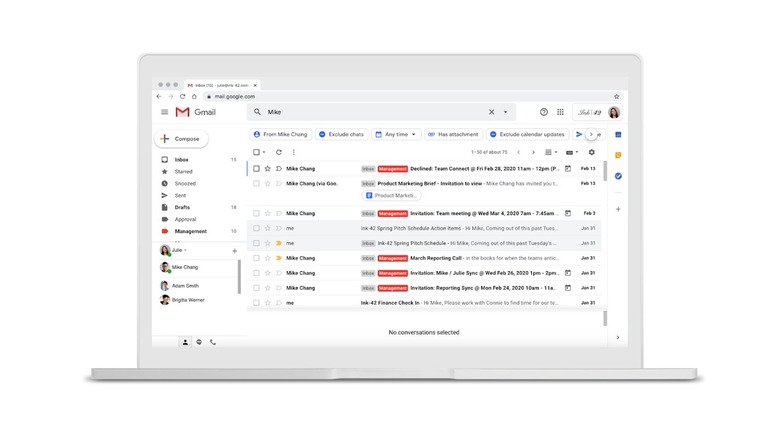Research Shows Gmail's Auto Email Categorization Is A Hot Mess For Political Campaigns
For years now, Google has been using an algorithm to automatically sort through the influx of Gmail emails and categorize them according to their purpose. Google can tell emails apart. That's why some of them go to spam, some of them are identified as malicious, and some of them are sent to the promotions folder that you might have enabled on your Gmail account. The feature is useful for sorting through unwanted emails and tossing out emails that don't require your attention. But new research shows that the email categorization algorithms that Google is using are a hot mess for political campaigns in a big electoral year such as 2020.
Conducted over four months by The Markup reporters, the research involved creating a brand new Gmail account using a Tor browser to block Google's ability to track additional user data that might influence the auto-categorization algorithms and a new phone number.
The account was used to sign up to all 16 presidential candidates, including Democrats and Republicans, and received more than 5,000 emails from 171 groups — the Trump campaign never sent a single email, as can be seen below.
The report explains that there's no cohesiveness when it comes to Google's sorting tools. Not all these emails went directly to the promotions or spam folders, as some of them made it to the primary folder, where all the essential emails go. The "winners" of the primary folder were Pete Buttigieg (63%) and Andrew Yang (47%). In theory, these two would have gotten their email in front of more Gmail users who subscribe to political campaigns. When it comes to actual numbers, an important detail the report doesn't go through, 27 Buttigieg emails and 32 Yang emails reached the primary Gmail tab during the period, and that's because the Yang campaign sent more emails during the same period.
The report's general conclusion is that Google's algorithms for sorting email might have a direct impact on a candidate's ability to raise money. Therefore, Google might influence elections with its product.

However, the test isn't perfect, because we're looking at just one email account. There's no bias that can be proven here. Google hasn't been favoring the Buttigieg and Yang campaigns at the expense of Sanders or Trump, as the table above might suggest.
It's still unclear how Google's algorithm works when it comes to sorting emails, especially the kind of emails that could cause some concern, like the political ones detailed in this report. But other factors would likely affect a real-life Google account, including the rest of your online activity. Other actions that Google associates with your account might affect the Gmail algorithm. Not to mention that not all people subscribe to all candidates' mailing lists. Having a broader group of people do that might prove a more scientific approach to determining any bias in the way Google sorts campaign emails.
Let's not forget that Gmail isn't the only email service that does the same kind of sorting. Gmail, and others, offer plenty of other categorization options that go beyond the automatic categories. And they'd impact the algorithms as well.
Most often, the emails from presidential candidates ended up in the promotions tabs the report notes, and some of the campaigns who responded to The Markup said they're not concerned about emails going to the promotions tab rather than the primary one.
Ultimately, it's still the user's choices that affect what happens with any incoming email. That's something any campaign looking to reach voters primarily via email should be aware of. But there are way too many factors that can influence Google's algorithms, themselves a secret Google doesn't talk about publicly, to conclude that any email service provider would use it to swing any sort of upcoming vote. That said, The Markup's report is a very good read, and it's available at this link.
